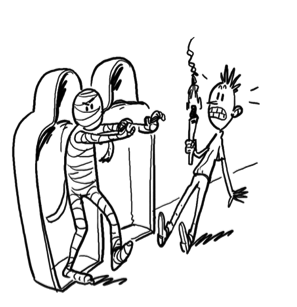 I am sure you already know about the Buying Centre, maybe you call it the Buying Group or Decision Making Unit and you may use different terminology to identify the people in it, but the principle remains the same. In a B2B sale there are several people, or groups of people, involved in making a purchase decision and you have to identify and communicate with them all. Note I said communicate, not talk to them.
I am sure you already know about the Buying Centre, maybe you call it the Buying Group or Decision Making Unit and you may use different terminology to identify the people in it, but the principle remains the same. In a B2B sale there are several people, or groups of people, involved in making a purchase decision and you have to identify and communicate with them all. Note I said communicate, not talk to them.
That is a one common pitfall to the Buying Centre, but first let me clarify what we are talking about.
Identifying all Roles in the Buying Centre
Every Sales Methodology has its own terminology. These are the Roles that Infoteam uses in every complex B2B sale. The Roles are specific to the sales opportunity.
-
Endorser
-
Decider
-
User
-
Assessor
-
Coach
The Endorser
This is the most senior person in the customer organisation who is involved in the decision, maybe even the CEO. It can also be a committee. A yes from the Endorser is required before the organisation commits to the investment.
This is the first place some Sales People make a big mistake. If you insist on talking directly to the Endorser you are likely to alienate your supporters. It is much better to create a powerful business case along with communication tools that help your contacts sell internally to the Endorser.
The Decider
This is the person, again it might be a team, who decides which solution is submitted to the Endorser for approval. The Decider is responsible for project success. You must have a good relationship with the Decider but always keep in mind they have to get their choice endorsed so you will need to give them the tools to sell internally.
There is always a risk that your solution will not be endorsed, not because it isn’t the best solution but because other projects are given priority. A good business case will be the best thing you can give your Decider in this scenario.
The User
Often ignored until it is too late, Users can help you to understand what is really needed and make a better case for your solution, or adapt your solution to deliver a better return. They definitely need to be on-board when you come to implement your solution. I have often seen organisations struggle to implement Sales Management Software that the Sales Team didn’t like only to abandon it a few months later because of poor uptake.
The Assessor
These tend to be experts inside or outside the customer organisation who are consulted about a particular aspect of your solution. They are important because they can say no and may well make recommendations if they like what they see, but this is where the second big pitfall lies.
Assessors cannot say ‘yes’ on their own. So don’t spend all your energy on them, even if they are very positive towards you. They are often the easiest people to get to speak to in the first place but often inflate their degree of influence. The longer you focus on them the more difficult it becomes to access the other roles.
One of my clients fell into the trap of focusing all efforts on an Assessor without understanding the rest of the Buying Centre. They were asked last May to pitch for part of a $1.4 billion dam construction project at short notice. In June they were told: “Great of you to meet us today, look forward to a long and profitable relationship”. In July, having submitted a proposal, they were told everything was fine and just awaiting approval, in August they had to tell the customer the resources required for the job had to be redeployed but they didn’t hear until October that the contract had been awarded to a competitor. If they had effectively covered the Buying Centre they might of won the business and they certainly would not have had valuable resources on hold while they waited for a response.
The key to the Buying Centre – The Coach
This is the closest thing there is to a ‘secret of success’ in B2B selling. Identifying and developing a suitable Coach quickly.
In a recent successful sale in the Insurance industry, which I described in detail in my blog ‘Turning a Gatekeeper into a Coach’ the Coach was quite simply the difference between winning and losing. It took a matter of weeks to earn her trust - and trust is the key.
So what can a Coach do for you? They are your guide around an organisation, someone who knows the real relationships between individuals and departments. They can help you gain access to the Buying Centre and perhaps give you insights into what the competition are up to. Also, they can be invaluable as a sounding board when you are mapping out the Buying Centre.
Recruiting and developing a Coach
You have to be astute in selecting your Coach and use all your skills to grow them into a really useful asset. Don’t be misled by friendly people who cannot or don’t want to give you the information you need – that is pitfall #3.
A relationship of mutual respect and trust is what you need. All your personal skills will be required but here are a few pointers to help you earn that trust. Start by finding out as much as you can about the organisation and the industry they work in. Then you can ask questions based on existing knowledge to fully understand and, if necessary, challenge their needs.
Then you have to prove you are worthy of trust. That means always being responsive, reliable, respectful and honest. Which includes saying no if you cannot fulfil a need. To further build trust, always summarise meetings and contacts and feed back to them to show you have understood what they have said.
Coaches usually have a dual-role in the Buying Centre but they could be someone who is not involved in the decision but with whom you have a strong track record. An external consultant who typically plays the role of an Assessor can also be a Coach.
One of the things you are giving the Coach in exchange for their help is the chance to shine in their organisation. So let them talk about themselves, make them feel important and give them anything you can help them in their role. It is best if their role as Coach is not too obvious within their organisation.
Covering the Buying Centre professionally
To sum up, you start with an initial contact, demonstrate that you are worthy of trust and if suitable develop them into a Coach. Use the Coach to help you map the Buying Centre and get feedback on how best to deal with them. Give all the people in the Buying Centre what they need either directly or by giving your contacts the tools they need to effectively sell internally.
Ask yourself
-
Do you map out all Buying Center roles in complex sales?
-
Do you have the skills to develop Coaches quickly?
-
Which roles did you not cover in a recently lost sale?
Enjoyed this blogpost? Download our eBook:

